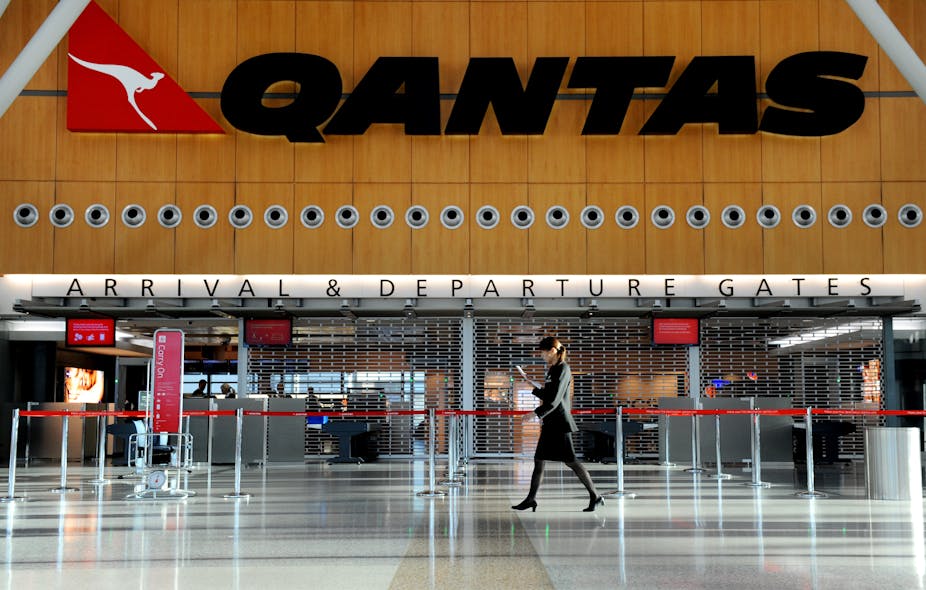Read the Fair Work Australia decision here
Read Roy Green, Dean of UTS Business School: Planes set to fly again - but what now for Qantas?
Read our previous coverage here
The decision by Fair Work Australia (FWA) to terminate industrial action between Qantas and three unions has delivered a more certain future for this protracted dispute, setting a timeline for conciliation and possible arbitration.
It will also limit the economic impact of Qantas chief executive Alan Joyce’s decision to ground the airline’s entire fleet on Saturday. The University of Sydney’s Shae McChrystal explains that the tribunal simply enforced long-standing legislation to protect Australia’s economy and essential services.
This is the biggest dispute yet to come before Fair Work Australia. Did the tribunal make the right decision?
You might say that this is the biggest case to be brought before FWA since it was set up, but certainly we have seen cases like this before the Australian Industrial Relations Commission (AIRC), which was the predecessor body to FWA.
FWA is a new institution, but the AIRC had considerable experience dealing with these sorts of matters.
FWA had to act in this case, and it had to move to either suspend or terminate the industrial action. By choosing to lock out staff and grounding all flights, Qantas left FWA with little choice given the statutory provisions.
The question is: should FWA have suspended the action or terminated it?
A suspension, which is what the unions were asking for, would have meant that there would have been no industrial action from any party in this dispute for a set period (the unions suggested 120 days). At the end of that period, protected industrial action could resume.
Fair Work instead terminated the action, which means that the parties will move into a conciliation process. The dispute will be conciliated by FWA. If after a 21-day period (unless this period is extended) no resolution has been reached, then FWA will impose an arbitrated outcome on the parties.
Why did Qantas want that outcome?
They wanted it because FWA can only arbitrate on anything that remains outstanding in a dispute that could otherwise be included in an enterprise agreement. Those issues don’t go to the heart of the dispute, which is the future of the airline as is prepares to move some of its operations offshore. An arbitrated outcome won’t prevent Qantas from restructuring, but it will bring the current bargaining round (and therefore, access to industrial action) to an end.
I don’t think that FWA really had a choice under the Fair Work Act. The tribunal has said that a suspension would continue to represent a threat to the airline industry, because people would be uncertain about the future of the bookings.
In some ways it seems like this is only way this dispute was going to have any results, because there were deeply entrenched positions over such difficult issues.
Is there anything particularly new in the industrial relations regime under the Fair Work Act that has led to this decision?
The provisions currently being used have in fact been in relevant federal legislation since 1993. They relate to a suspension or termination of protected industrial action on the basis of a threat to essential services or the Australian economy.
We have seen big cases where these provisions have been used in the past. So this is not unprecedented.
It is, however, unprecedented that it is happening in the aviation industry. If you think back to the last huge aviation industrial dispute in 1989, when we saw Ansett grounded when its pilots went on strike, these provisions were not in place then.
There was also no right to take lawful industrial action in 1989 – the right to do so was introduced in 1993. The essential services provisions that FWA has used were also implemented at that time.
So this has nothing to do with legislative change, or tribunal change – is an aspect of the Act that has been around for some time.
However, termination of protected industrial action is not something that we usually see. Usually we see a suspension.
This is an exceptional dispute because of its impact and the industry in which it is occurring, but it is not exceptional from a legal perspective.
What is likely to occur if the conciliation process is unsuccessful?
The conciliation period can be extended from the initial 21-day period for another 21 days.
But if no conclusion is reached in that time, then FWA will arbitrate on the outstanding matters.
That arbitration outcome would operate as a binding agreement between the unions and Qantas for the period of time that FWA decides. That could be up to three years.
This means that neither Qantas nor the unions can initiate further industrial action, but they could enter negotiations for a new agreement if they choose (without the ability to engage in lawful industrial action).
While that binding agreement is in place, any industrial action would be unlawful.

